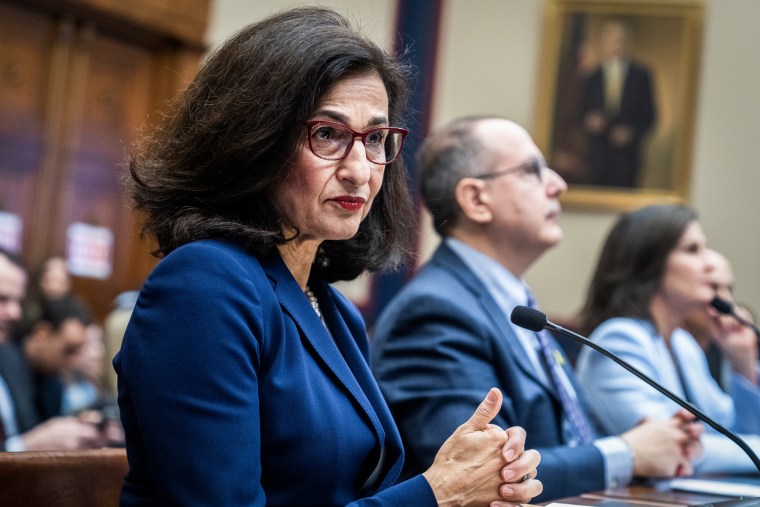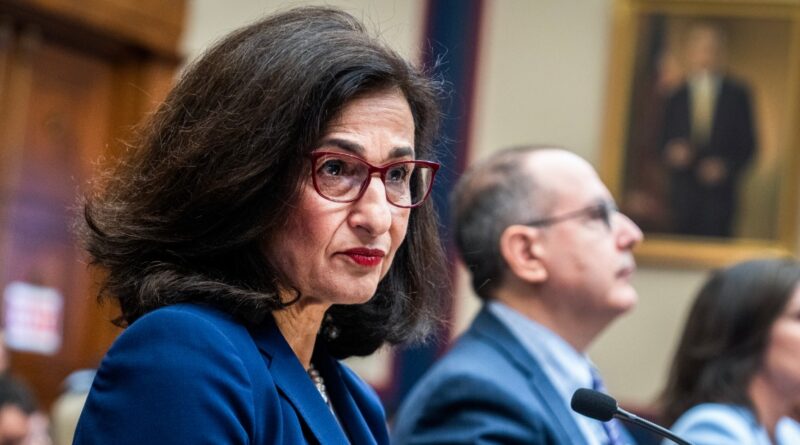Columbia University president grilled on campus antisemitism at congressional hearing
Columbia University’s president strongly denounced antisemitism during a congressional hearing Wednesday, saying that after Hamas’ Oct. 7 attack, “the world changed, and so did my focus.”
“Antisemitism has no place on our campus, and I am personally committed to doing everything I can to confront it directly,” President Nemat “Minouche” Shafik told the Republican-led House Committee on Education and the Workforce. “Israel was brutally attacked by Hamas terrorists and very soon it became clear that these horrific events would ignite fear and anguish across our campus.”
Shafik faced questions on her handling of antisemitism on campus after the Oct. 7 attack alongside two members of Columbia’s Board of Trustees and the head of the university’s antisemitism task force. She faced particular scrutiny for how the university handled faculty members who made comments about Hamas that were perceived as antisemitic.
Rep. Tim Walberg, R-Mich., grilled Shafik about Joseph Massad, a tenured professor in Columbia’s Middle Eastern, South Asian, and African Studies department who published comments in October calling Hamas’ attack a “stunning victory.”
“I do condemn his statement. I am appalled by what he said,” Shafik responded. “He has been spoken to.”
The hearing became particularly heated when Rep. Elise Stefanik, R-N.Y., pressed Shafik on why Massad is still listed on Columbia’s website as the chair of the academic review committee.
Stefanik asked Shafik for her commitment that Massad would be removed as chair, and Shafik said she would get back to her.
Stefanik also questioned Shafik about Mohamed Abdou, a visiting professor at the Middle East Institute at Columbia. She referred to an Oct. 11 post on Facebook in which Abdou wrote, “Yes, I’m with the muqawamah (the resistance) be it Hamas and Hezbollah and Islamic Jihad but up to a point.”
When asked about consequences, Shafik said Abdou “will never work at Columbia again.”

Her appearance in Congress came after she declined to testify at a hearing in December, citing scheduling conflicts.
That hearing included testimonies from the presidents of the University of Pennsylvania, Harvard and the Massachusetts Institute of Technology, who all drew intense scrutiny for their responses to questions regarding antisemitism and hate speech on campus. Penn and Harvard‘s presidents have since resigned.
When Shafik and her colleagues were asked by Rep. Suzanne Bonamici, D-Ore., whether calling for the genocide of Jewish people violates Columbia’s rules — the same question posed to Harvard, MIT and Penn’s presidents — all answered “yes.” Bonamici also asked Shafik about the chants “by any means necessary” and “intifada,” which Shafik said were distressing.
Ahead of her hearing, Shafik published an op-ed in The Wall Street Journal about what she planned to say in her testimony to Congress.
“Since the Oct. 7 Hamas attack, I have spent the most of my time addressing its aftershocks,” Shafik wrote. “It is hard to describe how difficult this has been, especially on a large, diverse urban campus with students from all over the world and a long tradition of political activism.”
Columbia is being sued by five Jewish students and two student organizations after it suspended the student groups Students for Justice in Palestine and Jewish Voice for Peace in November. In March, Shafik confirmed that a “number” of Columbia students were suspended after allegedly participating in an unauthorized panel called “Resistance 101” that featured speakers who supported Hamas.




